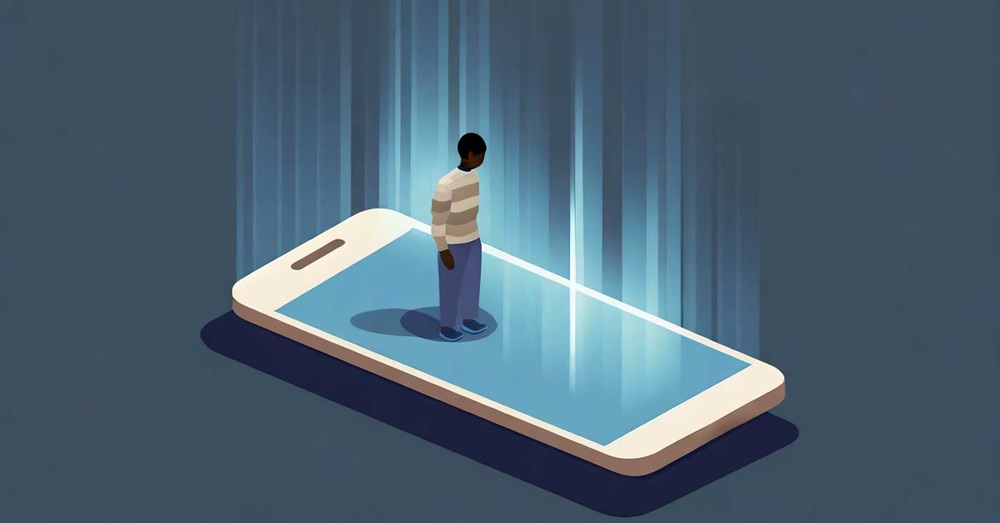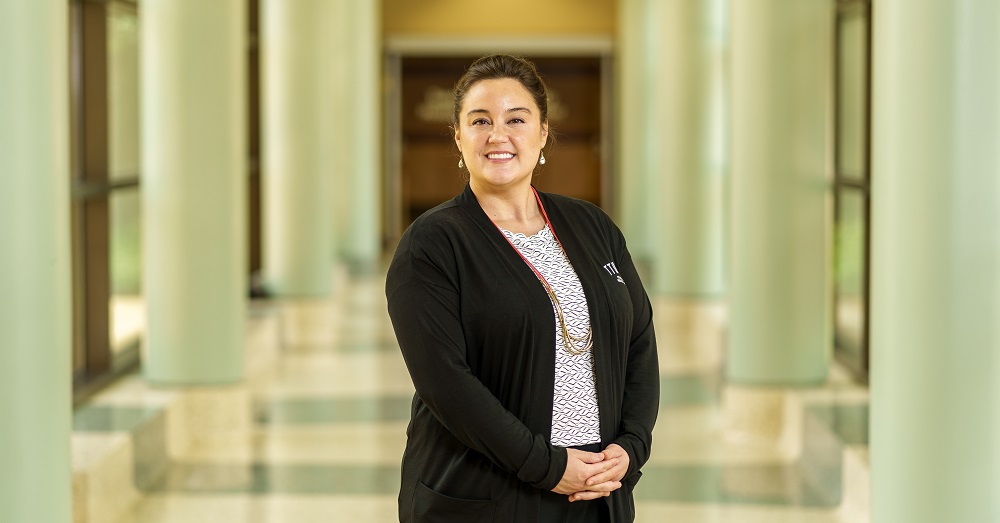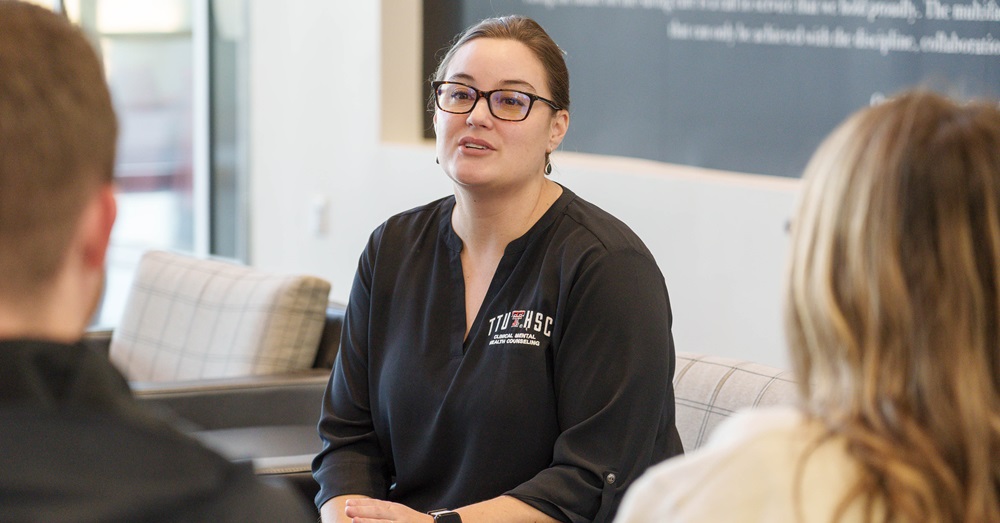Navigating Screen Time and Mental Health in the Digital Era

In today’s world screens are all around us at work, school and at home. Logan Winkelman, Ph.D., program director for the clinical mental health counseling program at the Texas Tech University Health Sciences Center, addresses excessive screen time and provides tips to focus on for the new year.
“These platforms are set up to play on those dopamine receptors,” Winkelman said. “So being addicted to these devices and screen time is a real thing. And that can lead to other challenges, because we may not be engaging in other activities, or it could be a coping mechanism. That can lead to other things like anxiety and depression.”
Physical ailments also can occur from excessive screen use. Winkelman mentioned these include eye strain, neck strain and headaches. She also revealed that the number one physical side effect of excessive screen time is sleep disturbance.

Logan Winkelman, Ph.D.
“If we’re on our phones when we’re trying to go to sleep, the being on our screens can keep our mind active when it’s trying to wind down,” Winkelman said. “The other piece is blue light, which interferes with our melatonin production. Melatonin is the hormone that allows us to feel sleepy and stay asleep. If the blue light is interfering with that melatonin production, it can physiologically affect your ability to sleep.”
Morning routines set the tone for the day. Winkelman explained how morning screen time can affect someone’s entire day. She also provided simple morning routine tips to implement.
“If the moment you wake up, you’re looking at your phone, and immediately you start getting flooded with emails, the news, or social media, you haven’t allowed your brain to really wake up and already you’re flooding it with information overload,” Winkelman said. “Before you start looking and scrolling and checking emails, allow yourself to have a calm and relaxing routine. That could be brushing your teeth, drinking a glass of water, doing some stretches, doing some breathing.”
Winkelman mentioned that children learn by example, and this is true with technology and screen time. “If adults around children are on their phones or on their tablets, they’ll learn to prioritize technology over other activities or even relationships. This can impact their development, social skills and attention span. And so, it’s really important that adults model having time limits or appropriate use of technology.”

Logan Winkelman, Ph.D.
Recommended screen time limits can be hard to follow for children, teens and adults. According to data from DataReportal, the average American spends nearly seven hours a day looking at screens.
“The literature states that children between the ages of two and five should get less than an hour of screen time,” Winkelman said. “Between six and up, it stays consistent at no more than two hours, and it stays the same for adults.”
Winkelman acknowledged that for adults, it can be difficult to limit screen time to two hours, especially if their job involves looking at a computer screen. She pointed out that taking frequent breaks is the best course of action.
“My recommendation is in alignment with what the literature states, which is to take frequent breaks,” Winkelman said. “Try to limit the exposure to screen time for children and teens, and even ourselves as adults. But when we’re using screens, making sure that we’re taking breaks because we need to give our eyes a break. We need to get out and have fresh air. Every 30 minutes while you’re on a screen, try to take a break, whether it's setting an alarm for 30 minutes to even just stretch, look outside or maybe just look around the room.”
Rome wasn’t built in a day, and the same goes for New Year's resolutions. Some will perhaps make a resolution to limit screen time, but Winkelman noted the importance of being easy on yourself. She also emphasized taking small steps in the right direction and not getting disheartened if you experience failure.
Winkelman acknowledged that technology isn’t all bad and that using it in moderation is okay. “It’s not about vilifying technology but understanding our habits around it and understanding that a lot of technology is designed to suck us in and capture our attention,” Winkelman said. “We need to take control of what we decide to give our attention instead of mindlessly doing it.”
Related Stories
The John Wayne Cancer Foundation Surgical Oncology Fellowship Program at Texas Tech University Health Sciences Center Announced
TTUHSC is collaborating with the John Wayne Cancer Foundation and has established the Big Cure Endowment, which supports the university’s efforts to reduce cancer incidence and increase survivability of people in rural and underserved areas.
Making Mental Health a Priority in the New Year
Sarah Mallard Wakefield, M.D., a psychiatrist with Texas Tech Physicians, talks about strategies to combat widespread and growing anxiety.
TTUHSC Dean to be Inducted into the National Academies of Practice as Distinguished Fellow
Gerard E. Carrino, Ph.D., MPH, dean of the TTUHSC Julia Jones Matthews School of Population and Public Health, will be inducted into the National Academies of Practice (NAP) as a Distinguished Fellow of the Public Health Academy.
Recent Stories
The John Wayne Cancer Foundation Surgical Oncology Fellowship Program at Texas Tech University Health Sciences Center Announced
TTUHSC is collaborating with the John Wayne Cancer Foundation and has established the Big Cure Endowment, which supports the university’s efforts to reduce cancer incidence and increase survivability of people in rural and underserved areas.
TTUHSC Receives $1 Million Gift from Amarillo National Bank to Expand and Enhance Pediatric Care in the Panhandle
TTUHSC School of Medicine leaders accepted a $1 million philanthropic gift from Amarillo National Bank on Tuesday (Feb. 10), marking a transformational investment in pediatric care for the Texas Panhandle.
Texas Tech University Health Sciences Center Permian Basin Announces Pediatric Residency Program Gift
TTUHSC Permian Basin, along with the Permian Strategic Partnership and the Scharbauer Foundation, Feb. 5 announced a gift that will fund a new pediatric residency.
